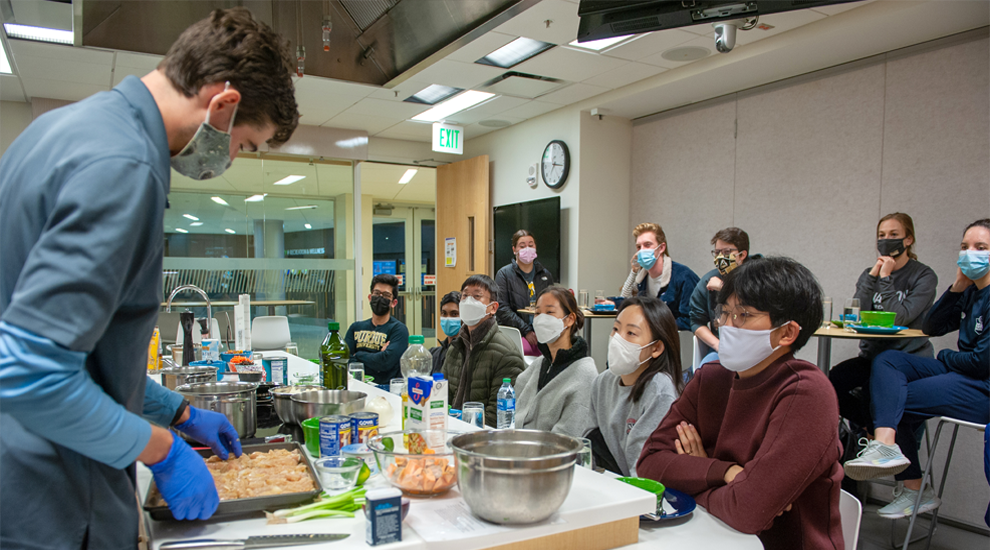Change isn’t easy. Small changes, like taking a new route to work, inevitably have hiccups. Larger changes can be even more difficult, especially in large departments as part of a large institution where change, especially in the current environment, seems constant. Constant change can have staff members wondering whether these changes are sustainable or just the “flavor of the month.” Students see the constant change and can stop paying attention, allowing the newness to wash over them. That is what makes what Recreation & Wellness (RecWell) has done to integrate the Steps to Leaps initiative so remarkable. RecWell has embraced the Steps to Leaps language and woven it into their programs to better support students.
It started with Michelle Whipple, senior associate director - programs, with support from her supervisor, Mike Warren, director of Recreation & Wellness. Steps to Leaps was not the first campus-wide initiative to align with Whipple’s work, so she began with the steps she knew would lead toward a successful implementation. The first step was to get her staff on board. She knew this wouldn’t be an easy task and wouldn’t be as simple as sending an email. Her first step was to educate the leadership staff about Steps to Leaps, its purpose and its impact for students. She found supporters of the Steps to Leaps initiative within her own department, like Will Evans, senior assistant director – wellness programs. Together, they educated staff about the purpose of Steps to Leaps and the impact it can have on student success.
“We’ve embedded a Steps to Leaps logo and language training into all of our students’ onboarding procedures, so that’s one of the first modules that all of our student employees go through,” Evans explains.
RecWell has also contributed multiple Steps to Leaps modules available to students on Brightspace. Evans also points to the presentation they do for students about using social support, as a coping mechanism for stress.
“The network pillar is there and there’s a little plug,” Evans says. “If you want to learn more about what this means you can go to this Steps to Leaps page and click on some of those modules to really learn more about social well-being and creating networks on campus.”
As the senior staff began to understand the purpose and impact of Steps to Leaps, Whipple and her RecWell colleagues encouraged them to educate their student and professional staff about the pillars and the language. Eventually, they saw a transition from staff only using required language to Steps to Leaps becoming woven into the language of how they were supporting and educating students. She began to see the language being used on more flyers and in more programs. She would find the language used in presentations and even the Steps to Leaps icons began to appear.
The final step was to see Steps to Leaps woven into programs more often. Whipple worked with her staff to include the implementation of a program using the Steps to Leaps language as part of their evaluation. She said that this aspect wasn’t difficult.
“You don’t have to create anything new,” Whipple says. “Just find ways to include the language.”
The goal is to ensure that using Steps to Leaps becomes so embedded in RecWell programs that it becomes second nature to use it.
RecWell leaders like Warren, Whipple and Evans know that if they can get their staff to keep using the Steps to Leaps language then students will begin to see that language as purposeful. They will then see how well-being programs in RecWell tie into the well-being programs they are attending in their residence halls and elsewhere on campus.
While well-being is one of the most emphasized Steps to Leaps pillars in RecWell, staff members see connections to each of the pillars. Warren sees Networks as a significant part of RecWell. He says he sees many students meeting other people and encouraging each other to play intramurals, join a club, work out together or take a group fitness class. To Warren, it’s that social aspect that can impact a student long-term. For example, Purdue Crew alumni from the 1980s and 90s routinely meet up with each other and stay connected. Those relationships and networks last a lifetime and began at RecWell.
The RecWell staff have begun the process of weaving the Steps to Leaps language into their work and the way they serve students. It is helping them align what they are doing to support students. It’s given them a common language and will continue to have a huge impact on helping students grow and thrive at Purdue.
Take a look at the training Purdue Recreation and Wellness developed for students on the Steps to Leaps Training @ Purdue site here.


